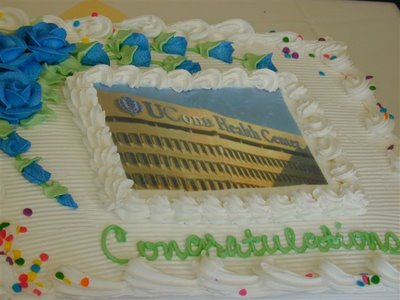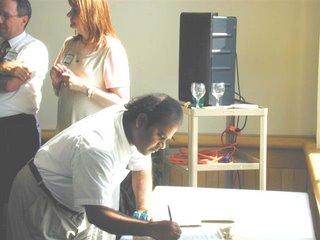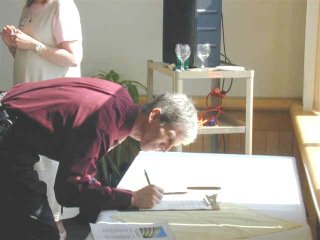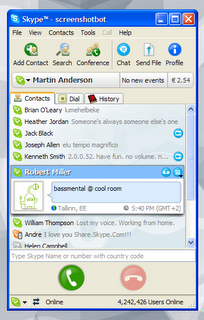 THE GENESIS OF "POSTDOC UNION" @ UCHC
THE GENESIS OF "POSTDOC UNION" @ UCHC
Scientists in the academic areas have various opinions about "UNIONS", especially about PostDoc unions. The views and opinions of unions can vary from either positive or negative perceptions about unions through the observations of the way unions funtion. Some of them agree that unions can help postdocs, some outrightly reject unions and yet another bunch just confused and have no clear idea.
Whatever those thoughts and opinions of the above category of academicians, in truth, all those perceptions and views on union stem from one's personal knowledge about union, one's personal experience or exposures to how unions function, or perhaps due to extremely well informed and throughouly learned thoughts OR due to poorly informed and ill thought feelings about unions.
Whatever?. A change is invitable in the academic structure and policies, because we can't live anymore in academy with the approach of 1870's. As I had mentioned elsewhere, PostDoc is a must for academic progress, but there are harldy any matching opportunities for all the postdocs, very insignificant number of postdocs only are able to gain faculty jobs.
There are not many faculty jobs, and the current status of PostDocs needs a change and overaual to meet this challenge. As more and more postdocs toil away their young years in lab in the name of training, it is absolutely painful to see PostDocs are exploited in labs without
proper pay, benefits and other employee packages. While it is unpractical and tough to create more faculty jobs to accommodate many postdocs, what is practical, reasonable and acceptable is to raise the package to postdocs equitable so that they can appreciate that they are employees and not worry about low pay, no respect and unnecessary burnouts. What is bothering here is that these PIs, administration and funding bodies knew all these facts but knowing these facts, they did not take enough effort to make changes in due time. As a result, postdocs everywhere are increasingly consious about their poor status and are working on their own to improve the cituation. IGNORANCE is never a good thing, whether it is academic or non-academic.
The election to unionized took place on August 28, 2003 [please see the news in AFT website below]. The resutls were announced end of the day of election, with the majority votes were in favor of union. This 2003 unionization event is the first of its kind, for the first time in the US history, PostDocs at the UCONN Health Center, following three year struggle to make policy changes that they could not ahcieve any changes as beeing a part of PostDoc association. They sought the right path to get things solved in favor of postdocs. The PostDocs Unionized in August 2003 . All the PostDocs worked hard with deligent steps to form a union by joining hands with the local UHP [University Health Professionals], which is an affiliate of the AFT [American Federation of Teachers]. Thereafter, within 6 month, they got the first contract nailed down, making the UCONN PostDocs best paid and best compensated in all respects. The Beautiful Congradulatory Cake above is for the first PostDoc Union contract success, inside the Cake is the most beautiful and elegant UCONN Conn Health Center, a very unique and complicated architexture provides whole beauty to the town of Farmington. I had my lab and computer desk and a microscope room at the fourth floor of this gorgeous building, I can never forget this building, work and all the wonderful experiences of UCONN Health Center, infact, my postdoc productivity was an outstanding one while I was fighting for PostDoc Unionization, both ended in great success.
http://www.aft.org/countmein/index.cfm
UConn Postdocs Vote for Union Postdoctoral fellows at the University of Connecticut Health Center made history on Aug. 28 by voting for representation by the University Health Professionals (UHP), an 1,800-member AFT Connecticut affiliate. The 138-member unit--possibly among the first postdocs in the country to join a union--took the first step towards better salaries, more respect and greater control over the direction of professional training. Calling the vote a "tremendous victory," AFT Connecticut president Sharon Palmer praised the perseverance and resolve of the unit, noting, "The postdocs have endured much hardship because of their commitment to science. Today they have taken action to gain a voice in the workplace and still maintain their commitment to their work."
The victory culminates a two-year fight for representation. Facing long hours, low wages and a lack of vacation time and sick days, postdoc organizers gathered enough support to file cards in December 2002--at which point the university raised a series of legal challenges to the election.
This week's victory validates the organizers' efforts and demonstrates that legal trickery cannot block the will of the unit members. The university will now have to go through the union in dealing with the postdocs, said UHP president Jean Morningstar, adding that she is looking forward to including the fellows in the union contract. "This election was always about respect and equity," said postdoctoral fellow John Wagner. With the election victory in hand, the fellows are especially eager to address their training in more detail in the contract.
The postdocs typically enter fellowships to gain specialized training that is important in the scientific market, so it is crucial that the right training be offered, says Wagner. [Mark Henson, AFT
 UHP president Gene Morningstar, giving the celeberatory talk, standing besides Gene is Dr.Peter J.Deckers, who is the CEO of UCONN Health Center waiting to give a talk and to congradulate the postdocs, followed by Cake cutting.
UHP president Gene Morningstar, giving the celeberatory talk, standing besides Gene is Dr.Peter J.Deckers, who is the CEO of UCONN Health Center waiting to give a talk and to congradulate the postdocs, followed by Cake cutting.
 The FIRST POSTDOC UNION:
The FIRST POSTDOC UNION: The First ever postdoc union formed at the Uconn Health Center in 2004, following the unionization within a year a contract was negotiated satisfactorily. Two of the postdoc seen signing the very first contract that was negotiated successefully with the administration. Also seen in the background are UHP union reps and faculty reps.
Very Latest PostDoc Union NewsPostdoc Unionization Drive Reaches a Climax in California
http://sciencecareers.sciencemag.org/career_development/previous_issues/articles/
2006_09_01/postdoc_unionization_drive_reaches_a_climax_in_california
Beryl Lieff Benderly
United States
1 September 2006
In the annals of the American labor movement, contested unionization campaigns are a common story, often involving downtrodden workers struggling against the concerted opposition of wealthy, powerful, even malign employers. This Labor Day weekend, however, the postdocs on the University of California’s (UC) ten campuses are embroiled in a unionization dispute that violates that time-honored script. The cast includes union organizers who claim to have the support of most UC postdocs, an employer that asserts neutrality, and an unknown number of postdocs who oppose the union and are working to defeat its efforts to organize their approximately 5800 colleagues.
If the union, which is known as PRO/UAW (its official title is Postdoctoral Researchers Organize/International Union, United Automobile, Aerospace and Agricultural Implement Workers of America), has valid signatures from 50%-plus-one of UC’s postdocs as it claims, unionization is automatic under state law. If it lacks 50%-plus-one but has 30%-plus-one, an election will be held to decide the issue. Opponents, however, are urging postdocs who have already given the union their signed consent to fight unionization by formally withdrawing their signatures.
http://sciencecareers.sciencemag.org/career_development/previous_issues/articles
/2006_03_03/the_state_of_the_union/(parent)/158
The State of the UnionBeryl Lieff Benderly
United States
3 March 2006
Two years ago this month, the nation’s first postdoc union, University Health Professionals (UHP) at the University of Connecticut Health Center (UCHC) in Farmington, overwhelmingly ratified its first contract. The pact provided higher pay, improved benefits, and a robust grievance procedure. Supporters of postdoc unions hoped it would launch a national movement. Detractors, meanwhile, feared it would damage postdocs’ relations with their advisers and their career prospects.
To date, neither prediction has come true. The contract quickly became the new normal in UCHC labs, where postdocs are only one category of workers in the long-established union, Local 3837 of the AFL-CIO-affiliated American Federation of Teachers. Right now, UHP and UCHC are conducting their regular quadrennial negotiations to renew the contract that covers postdocs and more than 1000 other UHP members. The talks are proceeding amicably, says UHP president Jean Morningstar, who foresees "no problems" and expects a new agreement to be ratified in the spring. Use the link for full article.......................!!!!?????.
A Union Contract Aimed at Preserving the Postdoc Experience
http://sciencecareers.sciencemag.org/career_development/previous_issues/articles/
2940/a_union_contract_aimed_at_preserving_the_postdoc_experience/
Beryl Lieff Benderly
United States
2 April 2004
Last summer, the postdocs at the University of Connecticut Health Center (UCHC) voted narrowly to join a labor union. On 16 March they voted overwhelmingly--80 to 5--to ratify what is believed to be the nation's first collective bargaining agreement specifically for postdocs. Negotiated by UCHC and the union, University Health Professionals (UHP), also known as Local 3837 of the AFL-CIO-affiliated American Federation of Teachers, the pact was hailed by both sides as fair and sensitive to postdocs' special status as both employees and trainees. It grants sharply improved pay and benefits and establishes UCHC's first minimum postdoc salary.
Provisions of the agreement
Unionization and Education: A Faculty View
http://sciencecareers.sciencemag.org/career_development/previous_issues/articles/
view/2800/unionization_and_education_a_faculty_
Beryl Lieff Benderly
United States
16 January 2004
University unions are much in the news these days. In early December 2003 an agreement between the University of California and United Auto Workers Local 2865, bargaining agent for 11,000 teaching assistants, tutors, and readers on the UC system's eight undergraduate teaching campuses, narrowly averted a strike scheduled for final exam week. Negotiations also began between the University of Connecticut Health Center (UCHC) in Farmington and University Health Professionals, the American Federation of Teachers local that represents the nation's first unionized postdocs.
The California contract covers only students involved in teaching, said Rajan Mehta, head union steward for the Berkeley campus, where he is a graduate student in math. "Research assistants are not currently organized under our union, or at all." Local 2865, however, is "considering" moving toward unionization of students employed in on-campus research. By a vote of 1628 to 26, members of the statewide union of so-called academic student employees ratified the 3-year contract granting them an immediate and retroactive 1.5% pay increase, future pay hikes tied to faculty raises, and continued complete remission of tuition and fees (including health care fees) despite recent, sharp increases in these charges. The union also won enhanced access to incoming graduate students. In light of California's present financial distress, this is considered a good settlement, Mehta added.
What Will Unions Bring to Postdocs?
Unionized Postdocs Unaffected by Decision Denying Union Right to Brown University Grad Assistants
http://sciencecareers.sciencemag.org/career_development/previous_issues/articles/3150/unionized
_postdocs_unaffected_by_decision_denying_union_right_to_brown_university_grad_assistants/
Beryl Lieff Benderly
United States
6 August 2004
Fifty years ago, on 17 May 1954, the unanimous Supreme Court decision in Brown v. Board of Education vastly expanded the rights of African-American students. The half-century commemorations had hardly ended, however, when, on 13 July 2004, another legal decision named Brown had the opposite effect on another group of students. In a case called Brown University, the National Labor Relations Board (NLRB) ruled that graduate assistants teaching courses and working in labs, libraries, museums, and offices on the private campus in Providence have no right to form a labor union.
Can Labor Unions Work for Postdocs?http://sciencecareers.sciencemag.org/career_development/previous_issues
/articles/2590/can_labor_unions_work_for_postdocs/(parent)/158
Beryl Lieff Benderly
United States
3 October 2003
In August, the postdocs at the University of Connecticut Health Center (UCHC) opened a new chapter in postdoc history and a new round in the debate over how best to improve postdoc working conditions. They voted to join University Health Professionals (UHP), a local of an AFL-CIO-affiliated national labor union, the American Federation of Teachers (AFT). UHP is a long-established bargaining unit at UCHC, representing 1900 of their 5000 employees. With their vote, this medical campus's 138 postdocs came to constitute the newest of UHP's approximately 170 job categories. Led and trained by experienced AFT negotiators, postdoc leaders will soon meet university officials at the bargaining table to work out a contract.............
 Simply Avoid Bagged Spinach for the moment, why? Recent illness and one death due to E.coli infection through bagged spinach. Read the following news....
Simply Avoid Bagged Spinach for the moment, why? Recent illness and one death due to E.coli infection through bagged spinach. Read the following news....









